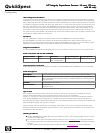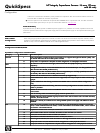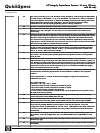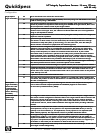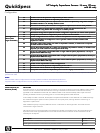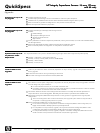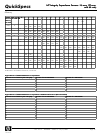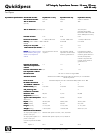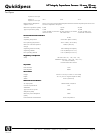
The following applies to CPU iCOD on Superdome servers:
The number of iCOD processors is selected per partition instead of per system at planning/order time.
At least one processor per cell in a partition must be a purchased processor.
Processors are deallocated by iCOD in such a way as to distribute deallocated processors evenly across the cells in a
partition. There is no way for a Customer Engineer (CE) or an Account Support Engineer (ASE) or a customer to
influence this distribution.
Reporting for the complex is done on a per partition basis. In other words, all partitions with iCOD processors must
be capable of and configured for sending e mail to HP.
Processors can be allocated and deallocated instantly or after a reboot at the discretion of the user.
A license key must be obtained prior to either activating or deactivating iCOD processors. A free license key is issued
once email connectivity with HP has been successfully established from all partitions with iCOD processors.
Performance Considerations with CPU iCOD:
Going from one to two to three active CPUs on a cell board gives linear performance improvement
Going from three to four active CPUs gives linear performance improvement for most applications except some
technical applications that push the memory bus bandwidth.
Number of active CPUs per cell boards should be balanced across partitions. However, minor differences are okay
(example: four active CPUs on one cell board and three active CPUs on the second cell board).
Note that the iCOD software will do CPU activation to minimize differences of number of active CPUs per cell board
within a partition.
Cell Board COD
Cell Board CODCell Board COD
Cell Board COD
With cell board COD, Superdome servers can be populated with Itanium 2 cell boards (CPU and memory) and it is no
longer necessary to pay for the additional cell boards (CPU and memory) until the customer uses them. Additional CPUs and
cell boards can be activated instantly with a simple command providing immediate increases in processing power and
memory capacity to accommodate application traffic demands.
In the unlikely event that a cell board fails, the HP system will replace the cell board at no additional charge. The COD cell
board brings the system back to full performance and capacity levels, reducing downtime and ensuring no degradation in
performance.
When additional capacity is required, additional cell boards can be brought online. The COD cell boards are each
activated with a single command.
Cell board Capacity on Demand (COD) can be ordered pre installed on Superdome servers. All cell boards within the
Superdome server will be populated with two or four CPUs and the customer orders the number of CPUs that must be
activated prior to shipment.
iCOD Temporary Capacity
iCOD Temporary CapacityiCOD Temporary Capacity
iCOD Temporary Capacity
Temporary Capacity for iCOD provides the customer the flexibility to temporarily activate an iCOD processor(s) for a 30-
CPU day period. The program includes a temporary Operating Environment (OE) license to use and temporary
hardware/software support. The iCOD temporary capacity program enables customers to tap into processing potential for a
fraction of the cost of a full activation, to better match expenditures with actual usage requirements and to enjoy the benefits
of a true utility model in a capitalized version.
To order iCOD temporary capacity on Superdome, A7067A must be ordered. For more information on iCOD, please refer to
the appropriate section in this guide.
Windows Server 2003
Windows Server 2003Windows Server 2003
Windows Server 2003
Superdome partitions running Windows Server 2003 Datacenter edition (64-bit) do not support CPU iCOD, cell board
iCOD and iCOD temporary capacity at this time.
Red Hat Enterprise Linux AS 3 and Debian Linux
Red Hat Enterprise Linux AS 3 and Debian LinuxRed Hat Enterprise Linux AS 3 and Debian Linux
Red Hat Enterprise Linux AS 3 and Debian Linux
Superdome partitions running Linux do not support CPU iCOD, cell board iCOD and iCOD temporary capacity.
Utility or Pay-per-Use Program
Utility or Pay-per-Use ProgramUtility or Pay-per-Use Program
Utility or Pay-per-Use Program
HP Utility Pricing allows financial decisions on investments to be postponed until sufficient information is available. It
allows customers to align their costs with revenues, thereby allowing customers to transition from fixed to variable cost
structures. This more flexible approach allows customers to size their compute capacity consistent with incoming revenues
QuickSpecs
HP Integrity Superdome Servers: 16-way, 32-way,
HP Integrity Superdome Servers: 16-way, 32-way,HP Integrity Superdome Servers: 16-way, 32-way,
HP Integrity Superdome Servers: 16-way, 32-way,
and 64-way
and 64-wayand 64-way
and 64-way
Configuration
DA - 11717 Worldwide — Version 2 — July 15, 2003
Page 25






